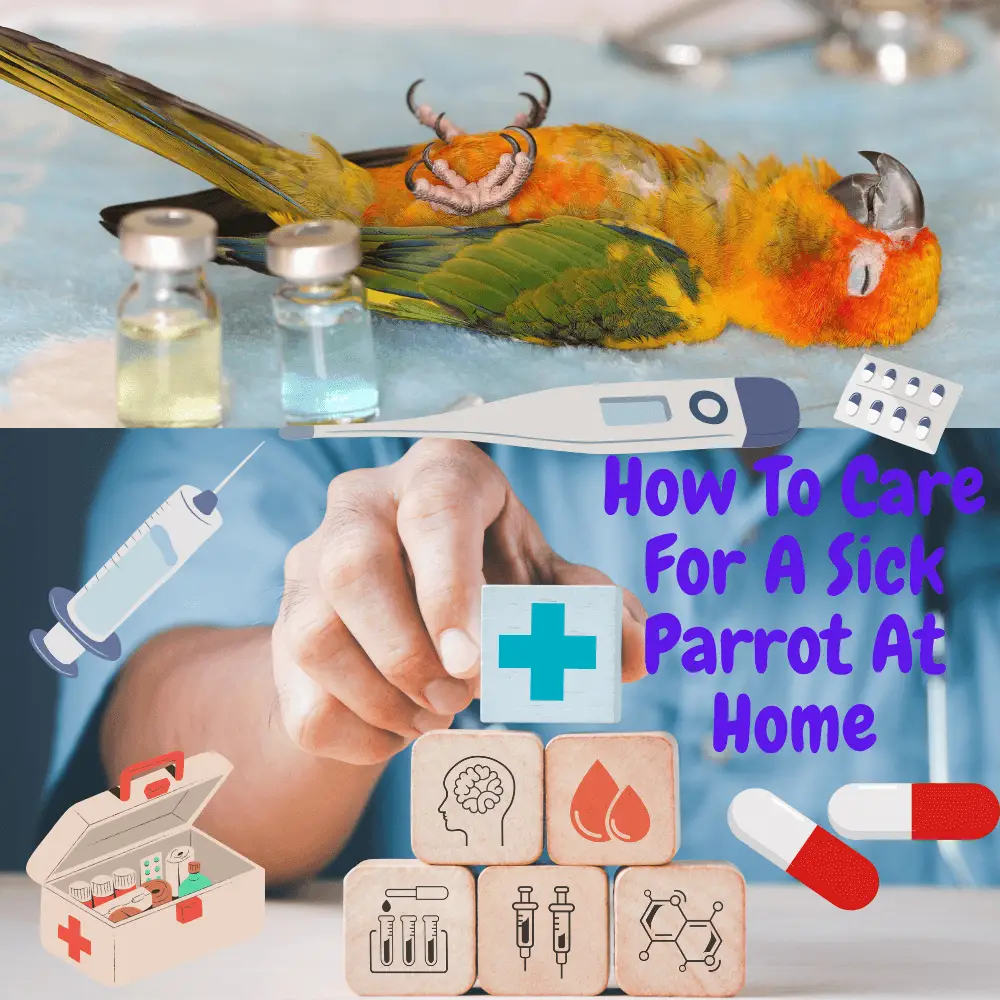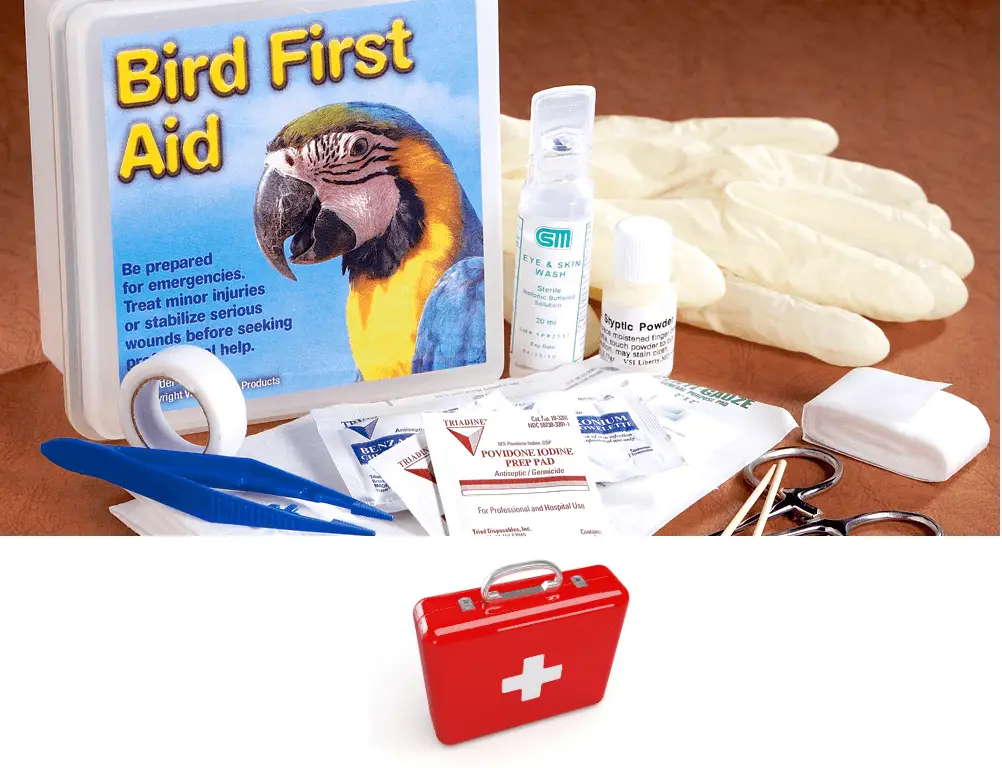
I am not a specialized veterinarian, but the time I spent with my grandmother’s parrot made me able to provide some first aid to her sick bird. Of course, sometimes she needed to go to a vet for medication.
So, if you have noticed that your parrot is suffering or does not seem to be in its usual state, we strongly recommend that you go to the vet as soon as possible, and this article will help you know how to treat your sick parrot, and how to care for it while it heals.
How to treat your sick parrot?
If you absolutely want to care for your parrot at home, let us guide you to find out how you can make yourself useful and help him in his recovery.
Some diseases will require medication prescriptions and some diseases will require you to leave it in the veterinary office for a while. Indeed, not all “home” remedies will help your adorable parrot.
So, if you want to treat your parrot at home, you need to be able to assess the severity of the disease your parrot is suffering from.
It is normal to want to relieve your bird as soon as possible with home remedies, and you can therefore try these two points:
- Increase the effectiveness of your immune system;
- Increase your appetite.
IMPORTANT: Do not self-medicate your parrot, and without advice from your veterinarian.
How can you help them strengthen their immune system?
To strengthen the immune system, improve liver function, and help your parrot’s digestive and respiratory systems, there are many remedies you can use, the most effective option being to use a solution of garlic and lemon.
To prepare it, simply:
- crush a single clove of garlic and put it in 300-500 ml of water;
- let the garlic soak in water for 8-10 hours;
- Strain the solution;
- and squeeze the lemon into it.
Note that you need to keep the drinker away from your parrot, quench its thirst for 4-5 hours, then give it the garlic and lemon solution and replace the mixture every 12 hours with a fresh mixture.
Continue to give the garlic and lemon solution to your bird for 3 to 5 days.
How to help him increase his appetite?
To increase your parrot’s appetite, you can add more pepper to his food, including cayenne pepper.
If he already has an advanced attachment or socialization phase, and you are used to feeding it by hand, you can solicit him and offer him food more frequently.
If by applying these techniques, your parrot does not regain strength, consult your veterinarian quickly. We will now explain the 9 points to help him in his physical recovery.
The 9 ways to take good care of and care for your sick parrot at home
Recognize the symptoms of a sick parrot
Recognizing and understanding the symptoms of a sick parrot can help your sick parrot and sometimes save his life. Indeed, there are multiple symptoms that reveal serious health problems. And without the immediate intervention of the veterinarian, the parrot can die.
Consult a veterinarian specializing in parrots
When you suspect there is a problem and your parrot has worrying symptoms, you need to go to the vet for a diagnosis and medication. Remember that giving your parrot any type of medicine without consulting a veterinarian can lead to death. Also, ask the veterinarian what side effects the drug could have on your bird.
Give him the medication according to the dosage
You should follow the exact instructions your veterinarian has given you regarding the use and dosage of medications.
Let your parrot rest in peace
Give your parrot rest and remove any source of stress around him. You can also change the usual location of his cage to a more private place, away from family members, noises, and any other pets.
Make sure there is no shortage of food or water
You need to make sure that your sick parrot eats its food well and drinks enough water. If they continue to reject food after your visit to the vet, call the vet back to give them information and receive further advice.
Keep it in a warm environment
Give your parrot warmth, especially if he was suffering from a cold or fever, or as directed by the veterinarian.
`
Keep your cage clean all the time
You should maintain hygiene inside your parrot as much as possible, even if your parrot does not suffer from the disease. This routine can prevent your parrot from getting infections or worsening his condition. So in the case of a sick bird, it is even more important to respect the impeccable hygiene of its cage.
Regularly monitor your health
You need to observe the condition of your parrot, especially if it is sick. You need to notice if the parrot becomes sicker, and if so, you need to inform the veterinarian. Persistent or even worsening symptoms are to be taken really seriously. If you let your parrot’s health worsen, there is a high risk that the veterinarian can no longer be of any recourse…
Take care of him and bring him your affection
The healing process of humans, cats, dogs, and any other living thing is both mental and physical. So you need to support your parrot. When you move his cage to a quiet place, be sure to watch him from time to time, and make him feel your existence, especially if he is very close to you (very advanced attachment phase).
Some parrots may show aggression toward their owner because all they want, while they are suffering, is tranquility… But persevere to see if your parrot can handle petting or any other interaction with you.
It is normal to want to take care of your sick parrot at home. However, despite all these tips, we remind you of the golden rule: if your parrot is in bad shape, do not delay in consulting your specialized veterinarian.
Share this article with your parrot friends on social networks!
SOURCE: Budgie and Aviary Birds





















